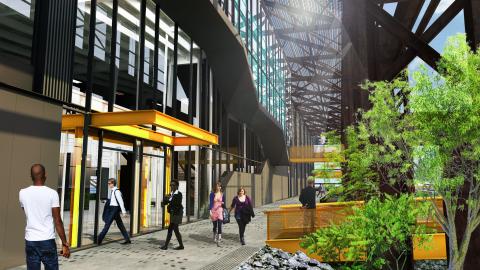Carnegie Mellon University researchers and robots will soon occupy a state-of-the-art facility at the newly constructed Mill 19 building on the 178-acre site known as Hazelwood Green.
The first building of the new Hazelwood Green development, Mill 19 once served as the location of the Pittsburgh region's most productive steel mills, employing more than 5,000 workers during its heyday. Today, as Carnegie Mellon gathers with community members and partners to celebrate its grand opening, Mill 19 will once again represent the region's leadership in manufacturing.

It is an exciting chapter in a story first envisioned and brought to life by three Pittsburgh foundations — The Richard King Mellon (RKM) Foundation, The Heinz Endowments and the Claude Worthington Benedum Foundation. In 2002, they purchased the dormant site with the goal of creating a new platform for experimentation to advance Pittsburgh's evolving innovation economy.
"Mill 19 at Hazelwood Green represents both our storied past and the promise of the region's future as a global innovation leader," said Carnegie Mellon President Farnam Jahanian. "The opening of this hub will usher in a new era of manufacturing while also serving as a powerful reminder of what we can achieve when public, private, civic and community partners come together to fuel innovative discovery and broaden opportunity."
Before construction began on the first building, the nonprofit Advanced Robotics for Manufacturing (ARM), which was catalyzed by Carnegie Mellon, and CMU's Manufacturing Futures Initiative (MFI) signed on as the anchor tenants with the Regional Industrial Development Corporation (RIDC), which owns Mill 19.
Along the way, partnerships have been key in shaping the efforts of these first tenants.
ARM launched in January of 2017 after receiving an $80 million grant from the Department of Defense. Before Mill 19, its headquarters operated out of Carnegie Mellon's National Robotics Engineering Center. The nonprofit's goal is to take new technologies and accelerate their adoption into commercialization, while catalyzing the workforce development programs to ensure that the United States has a skilled workforce for emerging technologies.
As part of the Manufacturing USA network, the creation of ARM puts Pittsburgh and CMU at the center of a new wave of U.S. manufacturing innovation, leveraging artificial intelligence, autonomy, 3D printing and other emerging technologies to make industrial and collaborative robotics more affordable for businesses of all sizes, adaptable for many uses and able to achieve more.

